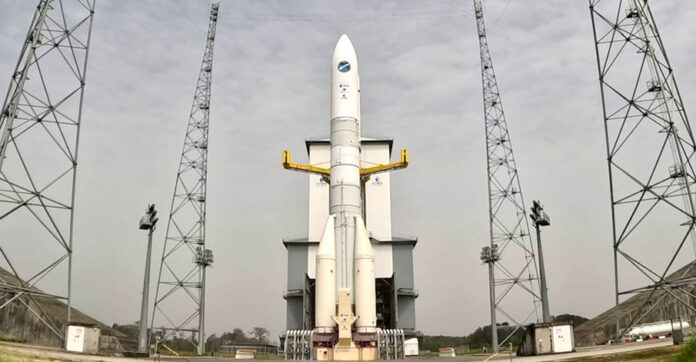
Europe’s Ariane 6 rocket was scheduled to launch for the first time on Tuesday, marking the end of a year-long pause in the continent’s independent access to space after a last-minute data issue. Images from the European Space Agency (ESA) showed the 56-meter rocket on its launchpad in French Guiana, with officials reporting favorable weather conditions.
“It looks very good. We have moderate risk of thunderstorms, but it’s getting better going into the (launch) window. So weather should not be a problem today,” said Toni Tolker-Nielsen, ESA’s acting director of space transportation, from the control room at Europe’s equatorial spaceport.
The rocket was officially slated to lift off during a four-hour window starting at 3:00 p.m. (1800 GMT). However, routine checks revealed a minor issue in a data acquisition system, delaying the earliest possible launch to 1900 GMT.
The nearly three-hour inaugural mission will not be commercial but will carry satellites and experiments from European agencies, companies, and universities. Final preparations were being made before handing over control to computers about eight minutes before launch. “We are readying everything so that we can push that button and start the automatic sequence, which will lead to the lift-off,” Tolker-Nielsen said.
Ariane 6, developed at an estimated cost of 4 billion euros by ArianeGroup (co-owned by Airbus and Safran), has faced several delays since its initial planned launch in 2020. With the retirement of the Ariane 5 rocket more than a year ago, Europe has had no independent means of launching satellites, and the conflict in Ukraine has disrupted Western access to Russian Soyuz rockets, while Italy’s Vega C remains grounded.
“Ariane 6 is fundamental for Europe’s space ambition,” Tolker-Nielsen stated. “It is about sovereign access to space for institutional and governmental missions … and this need has been even more emphasized in view of the geopolitical situation.”
The delay in Ariane 6’s launch capabilities highlighted Europe’s temporary isolation in the competitive global space-launch market, forcing some payloads to switch to SpaceX’s Falcon 9 rockets in the United States. ESA’s 22 nations decided in 2014 to develop the Ariane 6 in response to intense competition from Elon Musk’s private space venture.
ESA nations are also working to support small-launcher projects that could eventually rival SpaceX and Ariane 6. “Ariane 6 is not quite there yet in terms of competitiveness, but they want to get there,” said Ian Annett, former deputy CEO of the UK Space Agency.
If the debut goes well, Ariane 6 has around 30 customer missions lined up over the next several years, including 18 launches for Amazon’s Kuiper internet constellation, one of the planned competitors to SpaceX’s Starlink.
ESA has set an initial window for further launch attempts until July 31 if Tuesday’s launch is postponed.




